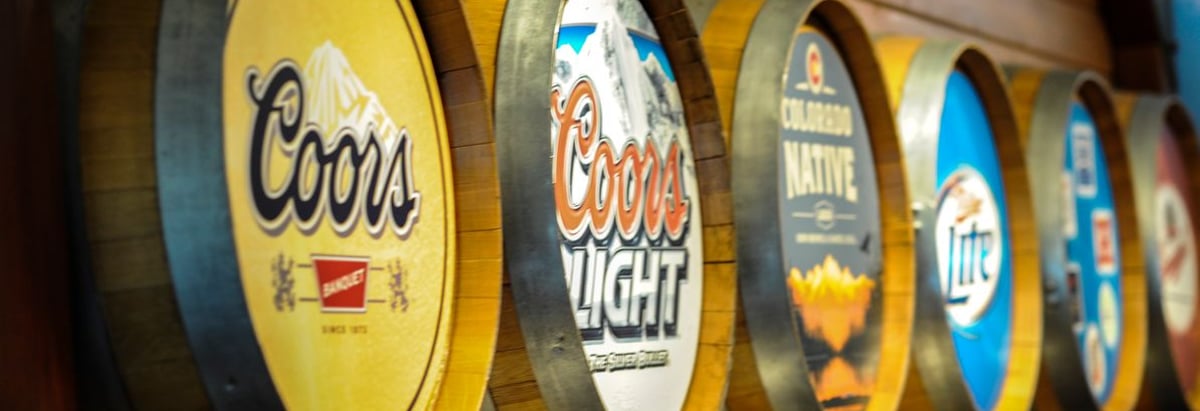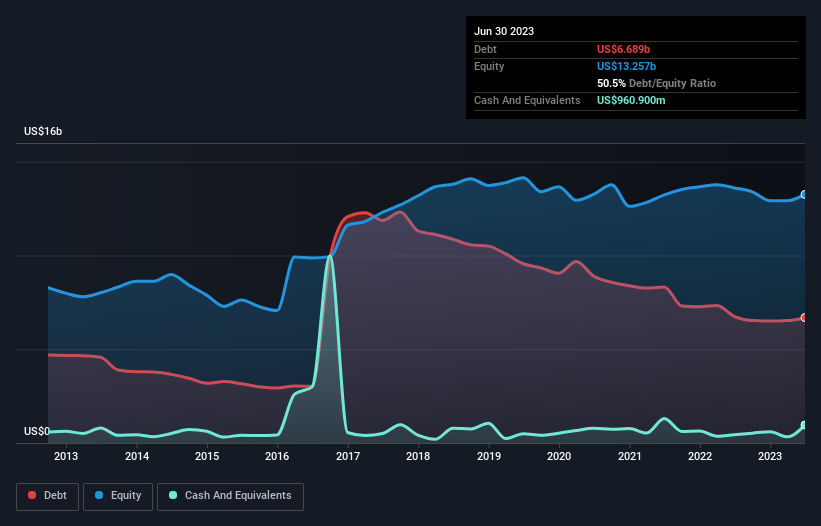- United States
- /
- Beverage
- /
- NYSE:TAP
We Think Molson Coors Beverage (NYSE:TAP) Can Stay On Top Of Its Debt

Legendary fund manager Li Lu (who Charlie Munger backed) once said, 'The biggest investment risk is not the volatility of prices, but whether you will suffer a permanent loss of capital.' It's only natural to consider a company's balance sheet when you examine how risky it is, since debt is often involved when a business collapses. As with many other companies Molson Coors Beverage Company (NYSE:TAP) makes use of debt. But should shareholders be worried about its use of debt?
When Is Debt Dangerous?
Generally speaking, debt only becomes a real problem when a company can't easily pay it off, either by raising capital or with its own cash flow. Ultimately, if the company can't fulfill its legal obligations to repay debt, shareholders could walk away with nothing. However, a more common (but still painful) scenario is that it has to raise new equity capital at a low price, thus permanently diluting shareholders. Of course, plenty of companies use debt to fund growth, without any negative consequences. The first step when considering a company's debt levels is to consider its cash and debt together.
Check out our latest analysis for Molson Coors Beverage
What Is Molson Coors Beverage's Net Debt?
The chart below, which you can click on for greater detail, shows that Molson Coors Beverage had US$6.69b in debt in June 2023; about the same as the year before. However, because it has a cash reserve of US$960.9m, its net debt is less, at about US$5.73b.

How Healthy Is Molson Coors Beverage's Balance Sheet?
The latest balance sheet data shows that Molson Coors Beverage had liabilities of US$3.83b due within a year, and liabilities of US$9.70b falling due after that. Offsetting this, it had US$960.9m in cash and US$1.14b in receivables that were due within 12 months. So it has liabilities totalling US$11.4b more than its cash and near-term receivables, combined.
This is a mountain of leverage even relative to its gargantuan market capitalization of US$13.9b. Should its lenders demand that it shore up the balance sheet, shareholders would likely face severe dilution.
In order to size up a company's debt relative to its earnings, we calculate its net debt divided by its earnings before interest, tax, depreciation, and amortization (EBITDA) and its earnings before interest and tax (EBIT) divided by its interest expense (its interest cover). Thus we consider debt relative to earnings both with and without depreciation and amortization expenses.
Molson Coors Beverage has a debt to EBITDA ratio of 2.9 and its EBIT covered its interest expense 5.5 times. This suggests that while the debt levels are significant, we'd stop short of calling them problematic. One way Molson Coors Beverage could vanquish its debt would be if it stops borrowing more but continues to grow EBIT at around 13%, as it did over the last year. When analysing debt levels, the balance sheet is the obvious place to start. But ultimately the future profitability of the business will decide if Molson Coors Beverage can strengthen its balance sheet over time. So if you're focused on the future you can check out this free report showing analyst profit forecasts.
Finally, a company can only pay off debt with cold hard cash, not accounting profits. So it's worth checking how much of that EBIT is backed by free cash flow. During the last three years, Molson Coors Beverage produced sturdy free cash flow equating to 70% of its EBIT, about what we'd expect. This cold hard cash means it can reduce its debt when it wants to.
Our View
On our analysis Molson Coors Beverage's conversion of EBIT to free cash flow should signal that it won't have too much trouble with its debt. But the other factors we noted above weren't so encouraging. For instance it seems like it has to struggle a bit to handle its total liabilities. Looking at all this data makes us feel a little cautious about Molson Coors Beverage's debt levels. While debt does have its upside in higher potential returns, we think shareholders should definitely consider how debt levels might make the stock more risky. The balance sheet is clearly the area to focus on when you are analysing debt. But ultimately, every company can contain risks that exist outside of the balance sheet. For instance, we've identified 4 warning signs for Molson Coors Beverage that you should be aware of.
At the end of the day, it's often better to focus on companies that are free from net debt. You can access our special list of such companies (all with a track record of profit growth). It's free.
If you're looking to trade Molson Coors Beverage, open an account with the lowest-cost platform trusted by professionals, Interactive Brokers.
With clients in over 200 countries and territories, and access to 160 markets, IBKR lets you trade stocks, options, futures, forex, bonds and funds from a single integrated account.
Enjoy no hidden fees, no account minimums, and FX conversion rates as low as 0.03%, far better than what most brokers offer.
Sponsored ContentNew: Manage All Your Stock Portfolios in One Place
We've created the ultimate portfolio companion for stock investors, and it's free.
• Connect an unlimited number of Portfolios and see your total in one currency
• Be alerted to new Warning Signs or Risks via email or mobile
• Track the Fair Value of your stocks
Have feedback on this article? Concerned about the content? Get in touch with us directly. Alternatively, email editorial-team (at) simplywallst.com.
This article by Simply Wall St is general in nature. We provide commentary based on historical data and analyst forecasts only using an unbiased methodology and our articles are not intended to be financial advice. It does not constitute a recommendation to buy or sell any stock, and does not take account of your objectives, or your financial situation. We aim to bring you long-term focused analysis driven by fundamental data. Note that our analysis may not factor in the latest price-sensitive company announcements or qualitative material. Simply Wall St has no position in any stocks mentioned.
About NYSE:TAP
Molson Coors Beverage
Manufactures, markets, and sells beer and other malt beverage products in the Americas, Europe, the Middle East, Africa, and the Asia Pacific.
Undervalued with proven track record and pays a dividend.


